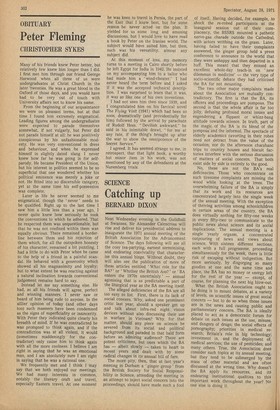SCIENCE
Catching up
BERNARD DIXON
Next Wednesday evening in the Guildhall at Swansea, Sir Alexander Cairncross will rise and deliver his presidential address to inaugurate the 1971 annual meeting of the British Association for the Advancement of Science. The days following will see all the cosy tea-partying, earnest sermonising, and endearing conviviality that characterise this annual binge. Without doubt, they will also see the publication of more of these articles entitled ' What role for the BA?' or Whither the British Ass?' or 'BA enters the 1970s uncertainly' — annual agonising that is as predictable a part of the liturgical year as the BA meeting itself.
The alleged deficiencies of the BA are all too easy to list. First, there is its lack of social concern. Why, asked one prominent critic last year, should a speaker get up and talk about infra-red night vision devices without also discussing their use in warfare in Vietnam? Why, for that matter, should any piece on science be severed from its social and political background and paraded in that bald form before an admiring audience? These are potent criticisms, but ones which the BA has — albeit slowly — taken to heart in recent years and dealt with by some radical changes in its annual bill of fare.
The more pity, then, that at last year's meeting in Durham a 'ginger group' from the British Society for Social Responsibility in Science, attending the meeting in an attempt to inject social concern into the proceedings, should have made such a fool of itself. Having decided, for example, to shock the re-robed participants at the inaugural session out of their complacency, the BSSRS mounted a pathetic nerve-gas charade outside the Cathedral, with actors writhing on the grass. Later, having failed to have their complaints answered, the ginger group held a press conference to announce to the world that they were unhappy and then departed in a huff. This meant that they missed an excellent whole-day teach-in on 'new dilemmas in medicine' — the very type of socio-scientific debate they had criticised the BA for not mounting.
The two other major complaints made about the Association are mutually contradictory. The first is that the BA, its officers and proceedings are pompous. The second is that the whole affair is far too jolly, defusing profound moral issues and engendering a flippant or whizz-bang attitude towards science. In truth, part of the magic of the BA is its blend of the pompous and the informal. The spectacle of elderly academics cavorting in their robes need not detract from the value of the occasion; nor do the afternoon charabanc trips to country houses and biscuit factories interfere with the serious discussion of matters of social concern. That both exist side by side is entirely to the good.
No, these are not the BA's real deficiencies. Those who concentrate on such tiresome complaints are missing the wood while looking at the trees. The overwhelming failure of the BA is simply that its work and its resources are concentrated largely into the single week of the annual meeting. With the exception of thriving activities among schoolchildren in certain areas of the country, the BA does virtually nothing for fifty-one weeks in every fifty-two to communicate to the public news about science and its social implications. The annual meeting is a single yearly orgasm, a concentrated outpouring of news and views about science. With sixteen different sections, each with a full programme, proceeding simultaneously for the week, there is little risk of escaping without indigestion. But more seriously, by disgorging so many goodies at one and the same time and place, the BA has no money or energy left for the rest of the year — except, of course, for planning the next big blow-out.
What the British Association ought to be doing is to mount debates, at a variety of levels, on scientific issues of great social concern — but to do so when those issues are in the news and causing public and parliamentary concern. The BA is ideally placed to act as a democratic forum for debate on such issues as the use, misuse, and dangers of drugs; the social effects of pornography; priorities in medical research; Britain's role in big technology; investment in, and the deployment of, medical services; the use of pesticides; and many others. True, the Association does consider such topics at its annual meeting, but they tend to be submerged by the mass of other material and are often discussed at the wrong time. Why doesn't the BA apply its resources, and its endearing institutional qualities to this important work throughout the year? No one else is doing it.


































 Previous page
Previous page